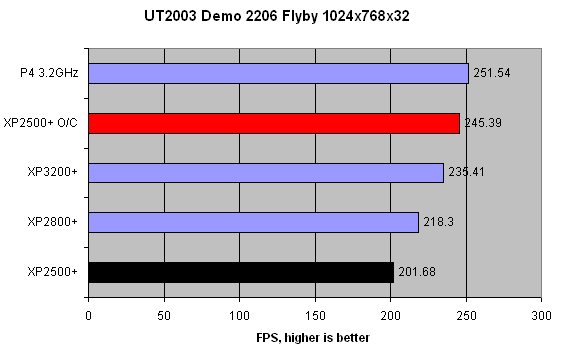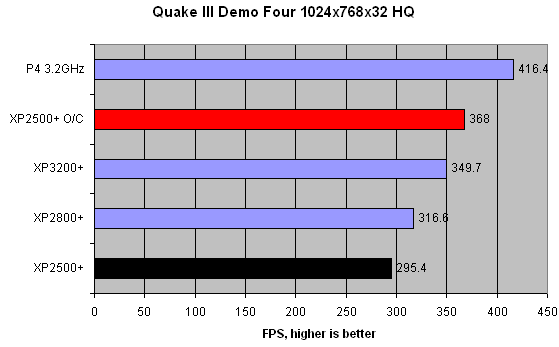Benchmarks III & thoughts
Unreal Tournament has always been responsive to system changes. Build 2206 of the publicly available demo is used. Just the flyby section at 1024x768x32.

Another 20%+ increase when going from default to overclocked. The 2332MHz / 212FSB Barton 2500+ is expected to beat the stock XP3200+ CPU, yet it still has a hard time toppling Intel's finest.

An Intel benchmarking benefit still allows the 2332MHz XP2500+ to hit almost 370FPS. It's plainly obvious that it is going to be faster than a standard, non-overclocked Barton XP2500+, but the benchmarks have shown that 20%+ performance increases are possible in gaming-related tests, assuming no image enhancement is factored in.
Final musings
The idea of getting some for effectively free has a powerful allure to it. Of course, most of us, if money was no object, would have cutting-edge PCs powered by the finest from AMD, Corsair, Western Digital, Soldam, etc. Money, however, is very much a stumbling block for most enthusiasts. That's one of the reasons why they turn to self-builds in the first instance.
Perhaps no other component can highlight the advantages of being able to go one, two, three or even four steps up the product hierarchy than CPUs. AMD's XP3200+ is architecturally identical to the much cheaper XP2500+. Differences in raw speed and FSB operation, AMD reckon, allows retailers to charge almost £300 more for the flagship chip. Our premise at the start of this investigation was to see if certain XP2500s, usually with a particular stepping, could emulate and surpass the XP3200's speed. Our sample XP2500+, with an AQXEA stepping and manufactured in week 30 of this year, managed exactly that, and all on average enthusiast air cooling. Imagine what it would manage with a R404a-powered Vapochill.
The question we now pose ourselves is whether other XP2500s are able to match or even surpass the prodigious potential of our sample. Perusing forums highlights that the AQXEA stepping generally hits between 2.3 - 2.5GHz on decent air cooling. XP2500s, though, do arrive in different stepping flavours, so it's absolutely crucial to have a guarantee of the CPU you'll receive. After all, £70 for a 2.3 - 2.4GHz-capable chip is akin to daylight robbery on your behalf. There are a few vendors who will guarantee a certain stepping (but not an end speed). CPU City are one, others will no doubt follow suit. The basic XP2500+ Barton is just an average performer in the presence of more illustrious company. The overclocked AQXEA XP2500, though, is a different proposition altogether, and it seems to get close to the current performance ceiling on all Barton-based cores. Just make sure your motherboard is up to the job of extracting maximum performance from the overclocked CPU.
Bottom line - if you're prepared to delve into the art of overclocking, you'll be considerably rewarded with an investment in these £70 wonders.














